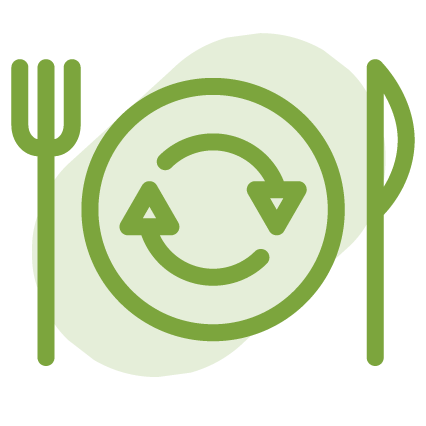The GL EVENTS group puts its ESG initiatives into practice at the Horizonia trade show
ESG is a central theme of our activities and of our company. The Horizonia trade show limits its environmental impact by implementing dedicated action plans with concrete results.
We set out to reduce our carbon footprint, limit the use of expendables to maximize our circular economy, and to develop diversity and the local benefit from our events.
Here therefore are the initiatives we have implemented at Horizonia to address these CSR issues:
1.Reducing the event’s carbon footprint
 TRANSPORT
TRANSPORT
- Encouragement to use car-sharing
- Encouragement to travel to the Eurexpo exhibition park using sustainable or public transport: tram, bus, etc. In particular, through the development of public transportation, daily service by the T5 streetcar from the center of Lyon within the Eurexpo park
 ELECTRICITY
ELECTRICITY
- Upgrading of the centralised management system to improve management of lighting in the exhibition area, and thermal comfort (air heating and cooling)
- Verification and upgrading of insulation of the park’s heating network
- Contract for the supply of green electricity
- Installation of external LED lighting and progressive roll-out across the exhibition area
- Installation of movement sensors in the exhibition area toilets (in progress)
- Visitor and exhibitor car parks are equipped with 24 charging terminals for electric vehicles
 RENEWABLE WATER AND ENERGY RESOURCES
RENEWABLE WATER AND ENERGY RESOURCES
- Twice-daily verification of all the water meters to check for leaks
- Decrease in CO2 emissions from our activities and from the venue’s consumption of resources
- Signing of the Climat Air Energie Territorial 2030 plan—the Lyon area’s sustainable development project—by local sites of the GL events group, the objective being to decrease greenhouse gas emissions in the Grand Lyon metropolitan area by over 40%.
- Installation of drinking fountains (non-chilled water) in the main entrance hall Renewable water and energy resources
2. Limiting the use of expendables
 RESPONSIBLE COMMUNICATION
RESPONSIBLE COMMUNICATION
- Printing of all communications documents (brochures, flyers, maps, programmes, invitation cards, press documents, etc.) on recycled paper
- Paperless communication tools wherever possible, like visitor badges, replaced by a QR code; like the trade show’s floor plan and programme (printed versions are not abandoned but we print a lot fewer and incite people to use the app.)
- Collection of the roll-ups by Ecopack Solutions, and re-use of these roll-ups to create Boomerang packaging.
- Use of recyclable materials for the small signs at the exhibition
- GreenTech+ lanyards made of RPET (100% recycled polyester) Responsible communication
 ECO-DESIGN
ECO-DESIGN
- Integration of recyclable or reusable materials (wood, card, etc.) in the design of stands and communal areas
- Reuse and rental of furniture for the event : roughly 90% of the furniture is reused in the scope of our other events
- Use of recyclable carpet in the exhibition aisles and reusable carpet tiles in certain areas of the exhibition,
- Discontinuation of aisle carpets, saving 8,800m² of carpeting – a full hall’s worth
 WASTE SORTING
WASTE SORTING
- Waste sorting during set-up, opening and dismantling, and reuse of the materials
- Installation of differentiated waste bins in the aisles at the exhibition to sort visitors’ waste
- Sorting now includes wood (partitions, flooring), card, brochures and a high percentage of carpet. Eurexpo provides a waste sorting guide for its clients
- For furnishing waste, a partnership has been established with Valdélia, the eco-organisation approved by the ministry of ecology, sustainable development and energy. Valdélia recovers everything made of wood (partitions, flooring, etc.) and the furniture left at exhibitions after dismantling. This is all evacuated in a dedicated skip.
- Plastic bottles are no longer provided in meeting rooms, a new Tetra Pak solution is in place instead
- Progressive transformation of the materials used for manufacturing commercial signs
 CATERING
CATERING
- Elimination of plastic, with recyclable table sets and the on-site caterers’ use of containers, plates and bowls, and packaging made from renewable, eco-compostable materials
- Sorting of cardboard, PET, glass, and recovery of plastic lids
3.Developing diversity and local benefit
 CATERING
CATERING
•Priority given to supplies from organic, local and seasonal produce sources
•Recovery of unsold cooked food by the association “Le Chaînon manquant” to reduce food waste
•Management of biowaste in all restaurants in the park
•Recovery of cooking oils by Bioval’huiles
•Recyclable restaurant placemats for all Eurexpo restaurants


